Investigating Social Factors & Obesity in Black and Ethnic Children
VerifiedAdded on 2023/06/12
|8
|2241
|128
Report
AI Summary
This research proposal investigates the social factors contributing to obesity in children from black and ethnic minority groups. It explores the concept of obesity, its relation to ethnicity, and specific social determinants like stress, trauma, and lack of education regarding food choices. The study employs a qualitative approach, utilizing substantive literature review and secondary data from sources like Science Direct, PubMed, and CINAHL. The research also considers ethical implications and provides a timeline for various activities, including literature review, data collection, analysis, and report submission. Theoretical frameworks such as Durkheim's functionalism and Marxism are applied to understand the societal and economic factors influencing obesity within these communities. The aim is to identify strategies to reduce the impact of social factors on childhood obesity in black and ethnic minority groups.
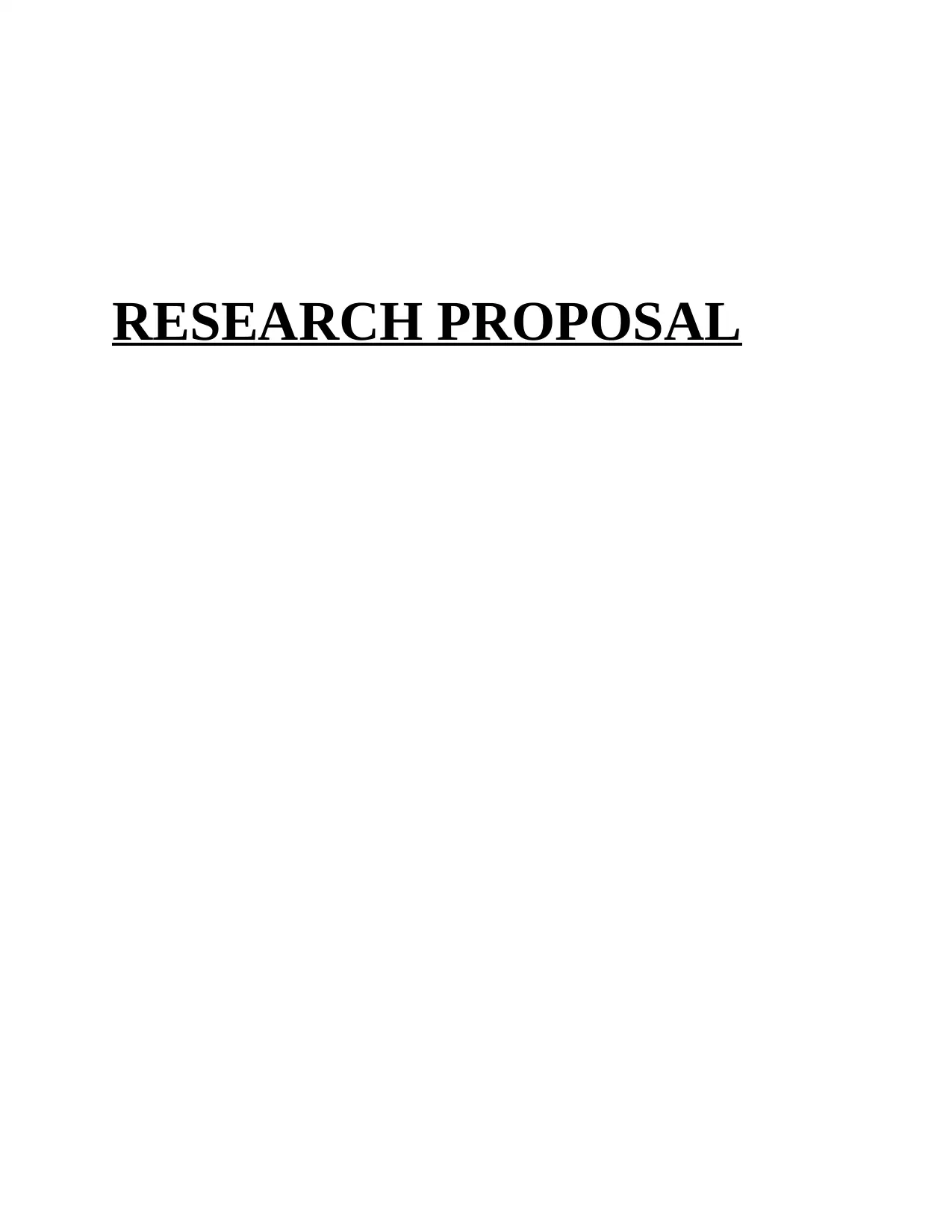
RESEARCH PROPOSAL
Paraphrase This Document
Need a fresh take? Get an instant paraphrase of this document with our AI Paraphraser
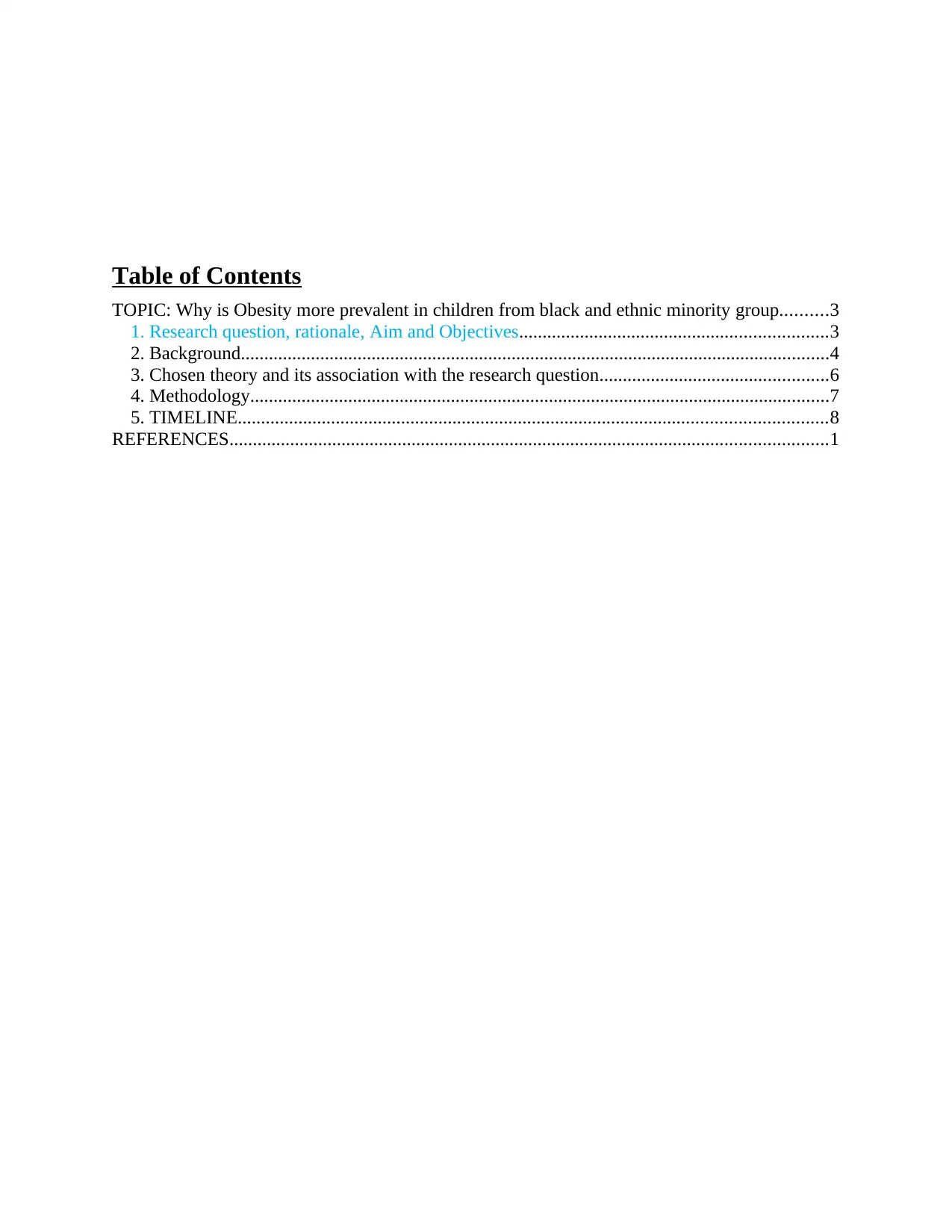
Table of Contents
TOPIC: Why is Obesity more prevalent in children from black and ethnic minority group..........3
1. Research question, rationale, Aim and Objectives..................................................................3
2. Background..............................................................................................................................4
3. Chosen theory and its association with the research question.................................................6
4. Methodology............................................................................................................................7
5. TIMELINE..............................................................................................................................8
REFERENCES................................................................................................................................1
TOPIC: Why is Obesity more prevalent in children from black and ethnic minority group..........3
1. Research question, rationale, Aim and Objectives..................................................................3
2. Background..............................................................................................................................4
3. Chosen theory and its association with the research question.................................................6
4. Methodology............................................................................................................................7
5. TIMELINE..............................................................................................................................8
REFERENCES................................................................................................................................1
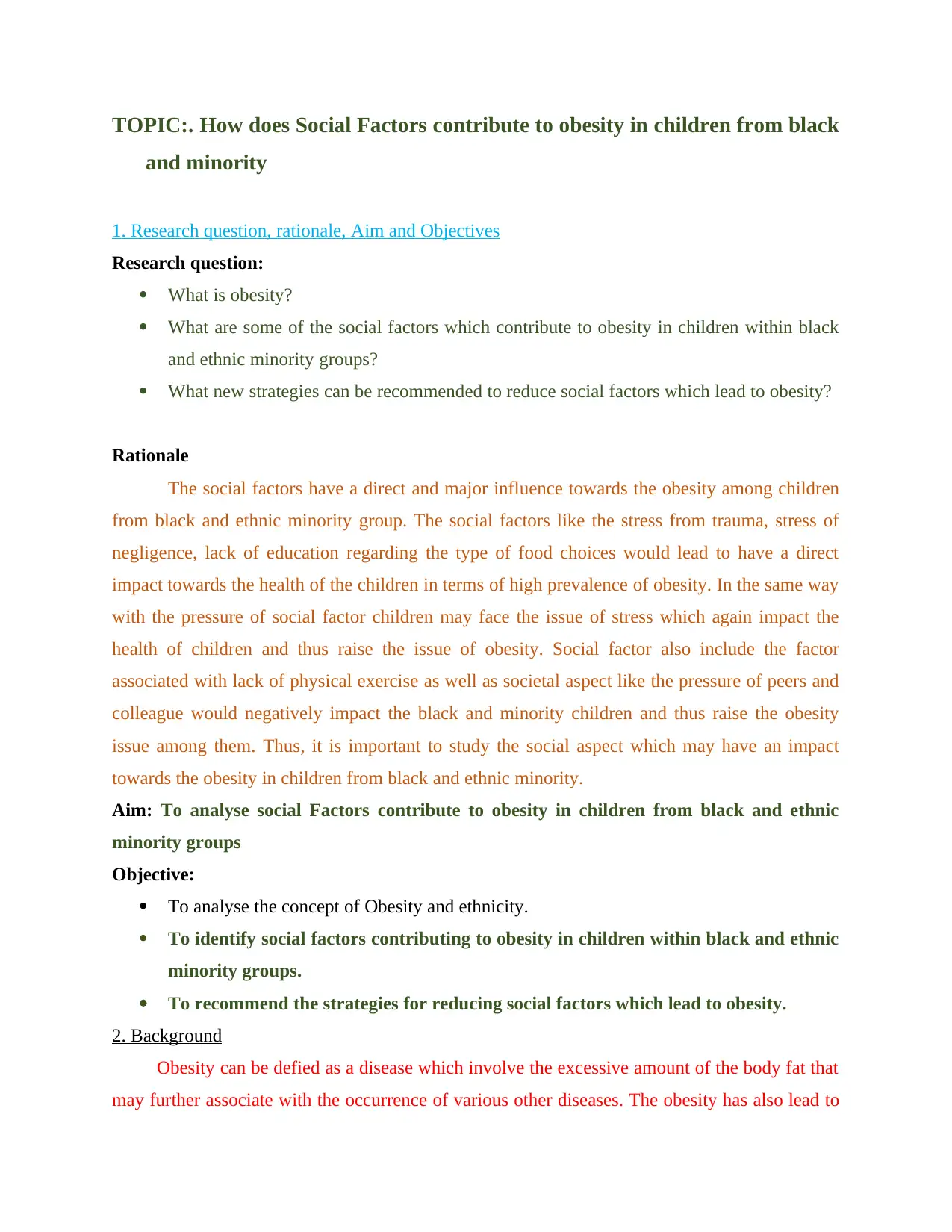
TOPIC:. How does Social Factors contribute to obesity in children from black
and minority
1. Research question, rationale, Aim and Objectives
Research question:
What is obesity?
What are some of the social factors which contribute to obesity in children within black
and ethnic minority groups?
What new strategies can be recommended to reduce social factors which lead to obesity?
Rationale
The social factors have a direct and major influence towards the obesity among children
from black and ethnic minority group. The social factors like the stress from trauma, stress of
negligence, lack of education regarding the type of food choices would lead to have a direct
impact towards the health of the children in terms of high prevalence of obesity. In the same way
with the pressure of social factor children may face the issue of stress which again impact the
health of children and thus raise the issue of obesity. Social factor also include the factor
associated with lack of physical exercise as well as societal aspect like the pressure of peers and
colleague would negatively impact the black and minority children and thus raise the obesity
issue among them. Thus, it is important to study the social aspect which may have an impact
towards the obesity in children from black and ethnic minority.
Aim: To analyse social Factors contribute to obesity in children from black and ethnic
minority groups
Objective:
To analyse the concept of Obesity and ethnicity.
To identify social factors contributing to obesity in children within black and ethnic
minority groups.
To recommend the strategies for reducing social factors which lead to obesity.
2. Background
Obesity can be defied as a disease which involve the excessive amount of the body fat that
may further associate with the occurrence of various other diseases. The obesity has also lead to
and minority
1. Research question, rationale, Aim and Objectives
Research question:
What is obesity?
What are some of the social factors which contribute to obesity in children within black
and ethnic minority groups?
What new strategies can be recommended to reduce social factors which lead to obesity?
Rationale
The social factors have a direct and major influence towards the obesity among children
from black and ethnic minority group. The social factors like the stress from trauma, stress of
negligence, lack of education regarding the type of food choices would lead to have a direct
impact towards the health of the children in terms of high prevalence of obesity. In the same way
with the pressure of social factor children may face the issue of stress which again impact the
health of children and thus raise the issue of obesity. Social factor also include the factor
associated with lack of physical exercise as well as societal aspect like the pressure of peers and
colleague would negatively impact the black and minority children and thus raise the obesity
issue among them. Thus, it is important to study the social aspect which may have an impact
towards the obesity in children from black and ethnic minority.
Aim: To analyse social Factors contribute to obesity in children from black and ethnic
minority groups
Objective:
To analyse the concept of Obesity and ethnicity.
To identify social factors contributing to obesity in children within black and ethnic
minority groups.
To recommend the strategies for reducing social factors which lead to obesity.
2. Background
Obesity can be defied as a disease which involve the excessive amount of the body fat that
may further associate with the occurrence of various other diseases. The obesity has also lead to
⊘ This is a preview!⊘
Do you want full access?
Subscribe today to unlock all pages.

Trusted by 1+ million students worldwide
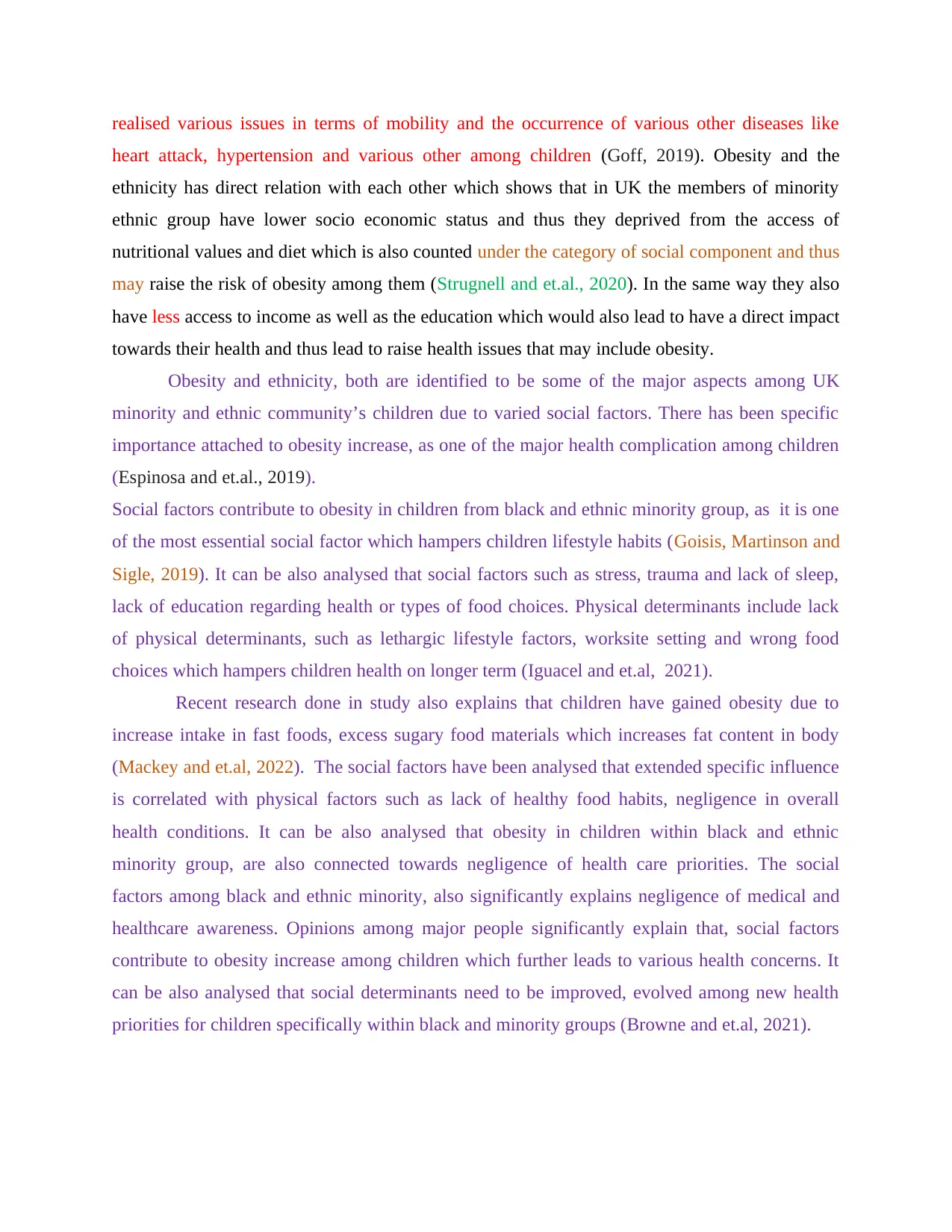
realised various issues in terms of mobility and the occurrence of various other diseases like
heart attack, hypertension and various other among children (Goff, 2019). Obesity and the
ethnicity has direct relation with each other which shows that in UK the members of minority
ethnic group have lower socio economic status and thus they deprived from the access of
nutritional values and diet which is also counted under the category of social component and thus
may raise the risk of obesity among them (Strugnell and et.al., 2020). In the same way they also
have less access to income as well as the education which would also lead to have a direct impact
towards their health and thus lead to raise health issues that may include obesity.
Obesity and ethnicity, both are identified to be some of the major aspects among UK
minority and ethnic community’s children due to varied social factors. There has been specific
importance attached to obesity increase, as one of the major health complication among children
(Espinosa and et.al., 2019).
Social factors contribute to obesity in children from black and ethnic minority group, as it is one
of the most essential social factor which hampers children lifestyle habits (Goisis, Martinson and
Sigle, 2019). It can be also analysed that social factors such as stress, trauma and lack of sleep,
lack of education regarding health or types of food choices. Physical determinants include lack
of physical determinants, such as lethargic lifestyle factors, worksite setting and wrong food
choices which hampers children health on longer term (Iguacel and et.al, 2021).
Recent research done in study also explains that children have gained obesity due to
increase intake in fast foods, excess sugary food materials which increases fat content in body
(Mackey and et.al, 2022). The social factors have been analysed that extended specific influence
is correlated with physical factors such as lack of healthy food habits, negligence in overall
health conditions. It can be also analysed that obesity in children within black and ethnic
minority group, are also connected towards negligence of health care priorities. The social
factors among black and ethnic minority, also significantly explains negligence of medical and
healthcare awareness. Opinions among major people significantly explain that, social factors
contribute to obesity increase among children which further leads to various health concerns. It
can be also analysed that social determinants need to be improved, evolved among new health
priorities for children specifically within black and minority groups (Browne and et.al, 2021).
heart attack, hypertension and various other among children (Goff, 2019). Obesity and the
ethnicity has direct relation with each other which shows that in UK the members of minority
ethnic group have lower socio economic status and thus they deprived from the access of
nutritional values and diet which is also counted under the category of social component and thus
may raise the risk of obesity among them (Strugnell and et.al., 2020). In the same way they also
have less access to income as well as the education which would also lead to have a direct impact
towards their health and thus lead to raise health issues that may include obesity.
Obesity and ethnicity, both are identified to be some of the major aspects among UK
minority and ethnic community’s children due to varied social factors. There has been specific
importance attached to obesity increase, as one of the major health complication among children
(Espinosa and et.al., 2019).
Social factors contribute to obesity in children from black and ethnic minority group, as it is one
of the most essential social factor which hampers children lifestyle habits (Goisis, Martinson and
Sigle, 2019). It can be also analysed that social factors such as stress, trauma and lack of sleep,
lack of education regarding health or types of food choices. Physical determinants include lack
of physical determinants, such as lethargic lifestyle factors, worksite setting and wrong food
choices which hampers children health on longer term (Iguacel and et.al, 2021).
Recent research done in study also explains that children have gained obesity due to
increase intake in fast foods, excess sugary food materials which increases fat content in body
(Mackey and et.al, 2022). The social factors have been analysed that extended specific influence
is correlated with physical factors such as lack of healthy food habits, negligence in overall
health conditions. It can be also analysed that obesity in children within black and ethnic
minority group, are also connected towards negligence of health care priorities. The social
factors among black and ethnic minority, also significantly explains negligence of medical and
healthcare awareness. Opinions among major people significantly explain that, social factors
contribute to obesity increase among children which further leads to various health concerns. It
can be also analysed that social determinants need to be improved, evolved among new health
priorities for children specifically within black and minority groups (Browne and et.al, 2021).
Paraphrase This Document
Need a fresh take? Get an instant paraphrase of this document with our AI Paraphraser
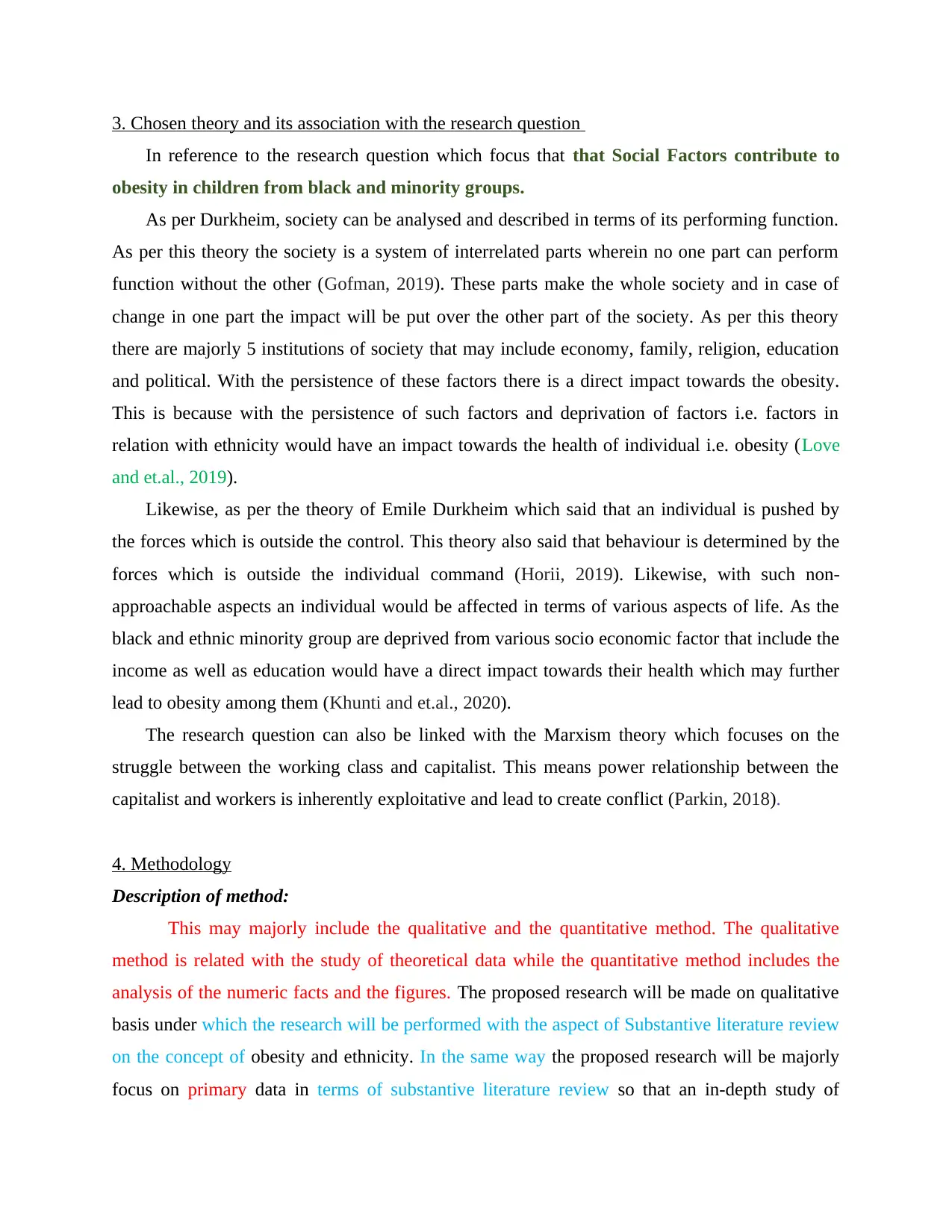
3. Chosen theory and its association with the research question
In reference to the research question which focus that that Social Factors contribute to
obesity in children from black and minority groups.
As per Durkheim, society can be analysed and described in terms of its performing function.
As per this theory the society is a system of interrelated parts wherein no one part can perform
function without the other (Gofman, 2019). These parts make the whole society and in case of
change in one part the impact will be put over the other part of the society. As per this theory
there are majorly 5 institutions of society that may include economy, family, religion, education
and political. With the persistence of these factors there is a direct impact towards the obesity.
This is because with the persistence of such factors and deprivation of factors i.e. factors in
relation with ethnicity would have an impact towards the health of individual i.e. obesity (Love
and et.al., 2019).
Likewise, as per the theory of Emile Durkheim which said that an individual is pushed by
the forces which is outside the control. This theory also said that behaviour is determined by the
forces which is outside the individual command (Horii, 2019). Likewise, with such non-
approachable aspects an individual would be affected in terms of various aspects of life. As the
black and ethnic minority group are deprived from various socio economic factor that include the
income as well as education would have a direct impact towards their health which may further
lead to obesity among them (Khunti and et.al., 2020).
The research question can also be linked with the Marxism theory which focuses on the
struggle between the working class and capitalist. This means power relationship between the
capitalist and workers is inherently exploitative and lead to create conflict (Parkin, 2018).
4. Methodology
Description of method:
This may majorly include the qualitative and the quantitative method. The qualitative
method is related with the study of theoretical data while the quantitative method includes the
analysis of the numeric facts and the figures. The proposed research will be made on qualitative
basis under which the research will be performed with the aspect of Substantive literature review
on the concept of obesity and ethnicity. In the same way the proposed research will be majorly
focus on primary data in terms of substantive literature review so that an in-depth study of
In reference to the research question which focus that that Social Factors contribute to
obesity in children from black and minority groups.
As per Durkheim, society can be analysed and described in terms of its performing function.
As per this theory the society is a system of interrelated parts wherein no one part can perform
function without the other (Gofman, 2019). These parts make the whole society and in case of
change in one part the impact will be put over the other part of the society. As per this theory
there are majorly 5 institutions of society that may include economy, family, religion, education
and political. With the persistence of these factors there is a direct impact towards the obesity.
This is because with the persistence of such factors and deprivation of factors i.e. factors in
relation with ethnicity would have an impact towards the health of individual i.e. obesity (Love
and et.al., 2019).
Likewise, as per the theory of Emile Durkheim which said that an individual is pushed by
the forces which is outside the control. This theory also said that behaviour is determined by the
forces which is outside the individual command (Horii, 2019). Likewise, with such non-
approachable aspects an individual would be affected in terms of various aspects of life. As the
black and ethnic minority group are deprived from various socio economic factor that include the
income as well as education would have a direct impact towards their health which may further
lead to obesity among them (Khunti and et.al., 2020).
The research question can also be linked with the Marxism theory which focuses on the
struggle between the working class and capitalist. This means power relationship between the
capitalist and workers is inherently exploitative and lead to create conflict (Parkin, 2018).
4. Methodology
Description of method:
This may majorly include the qualitative and the quantitative method. The qualitative
method is related with the study of theoretical data while the quantitative method includes the
analysis of the numeric facts and the figures. The proposed research will be made on qualitative
basis under which the research will be performed with the aspect of Substantive literature review
on the concept of obesity and ethnicity. In the same way the proposed research will be majorly
focus on primary data in terms of substantive literature review so that an in-depth study of
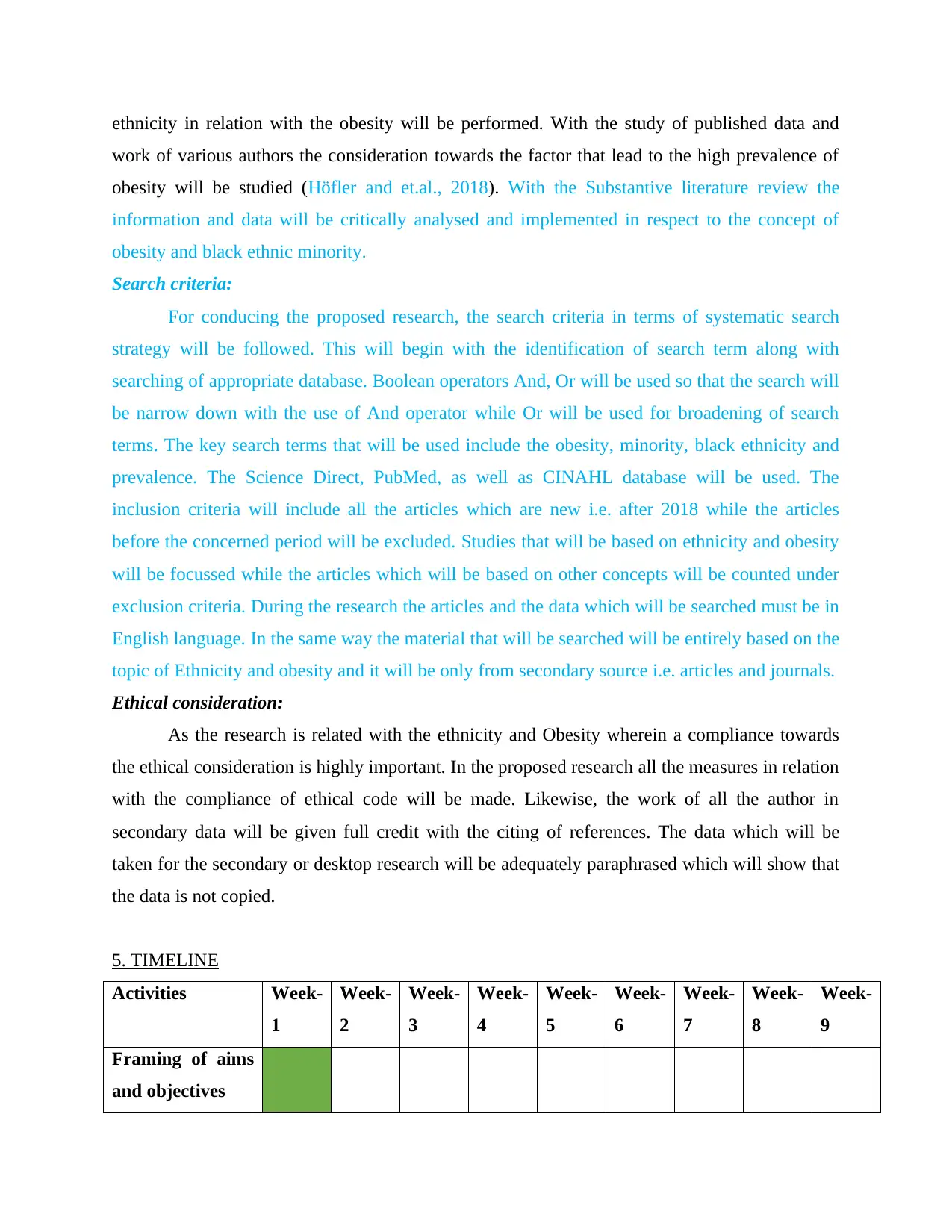
ethnicity in relation with the obesity will be performed. With the study of published data and
work of various authors the consideration towards the factor that lead to the high prevalence of
obesity will be studied (Höfler and et.al., 2018). With the Substantive literature review the
information and data will be critically analysed and implemented in respect to the concept of
obesity and black ethnic minority.
Search criteria:
For conducing the proposed research, the search criteria in terms of systematic search
strategy will be followed. This will begin with the identification of search term along with
searching of appropriate database. Boolean operators And, Or will be used so that the search will
be narrow down with the use of And operator while Or will be used for broadening of search
terms. The key search terms that will be used include the obesity, minority, black ethnicity and
prevalence. The Science Direct, PubMed, as well as CINAHL database will be used. The
inclusion criteria will include all the articles which are new i.e. after 2018 while the articles
before the concerned period will be excluded. Studies that will be based on ethnicity and obesity
will be focussed while the articles which will be based on other concepts will be counted under
exclusion criteria. During the research the articles and the data which will be searched must be in
English language. In the same way the material that will be searched will be entirely based on the
topic of Ethnicity and obesity and it will be only from secondary source i.e. articles and journals.
Ethical consideration:
As the research is related with the ethnicity and Obesity wherein a compliance towards
the ethical consideration is highly important. In the proposed research all the measures in relation
with the compliance of ethical code will be made. Likewise, the work of all the author in
secondary data will be given full credit with the citing of references. The data which will be
taken for the secondary or desktop research will be adequately paraphrased which will show that
the data is not copied.
5. TIMELINE
Activities Week-
1
Week-
2
Week-
3
Week-
4
Week-
5
Week-
6
Week-
7
Week-
8
Week-
9
Framing of aims
and objectives
work of various authors the consideration towards the factor that lead to the high prevalence of
obesity will be studied (Höfler and et.al., 2018). With the Substantive literature review the
information and data will be critically analysed and implemented in respect to the concept of
obesity and black ethnic minority.
Search criteria:
For conducing the proposed research, the search criteria in terms of systematic search
strategy will be followed. This will begin with the identification of search term along with
searching of appropriate database. Boolean operators And, Or will be used so that the search will
be narrow down with the use of And operator while Or will be used for broadening of search
terms. The key search terms that will be used include the obesity, minority, black ethnicity and
prevalence. The Science Direct, PubMed, as well as CINAHL database will be used. The
inclusion criteria will include all the articles which are new i.e. after 2018 while the articles
before the concerned period will be excluded. Studies that will be based on ethnicity and obesity
will be focussed while the articles which will be based on other concepts will be counted under
exclusion criteria. During the research the articles and the data which will be searched must be in
English language. In the same way the material that will be searched will be entirely based on the
topic of Ethnicity and obesity and it will be only from secondary source i.e. articles and journals.
Ethical consideration:
As the research is related with the ethnicity and Obesity wherein a compliance towards
the ethical consideration is highly important. In the proposed research all the measures in relation
with the compliance of ethical code will be made. Likewise, the work of all the author in
secondary data will be given full credit with the citing of references. The data which will be
taken for the secondary or desktop research will be adequately paraphrased which will show that
the data is not copied.
5. TIMELINE
Activities Week-
1
Week-
2
Week-
3
Week-
4
Week-
5
Week-
6
Week-
7
Week-
8
Week-
9
Framing of aims
and objectives
⊘ This is a preview!⊘
Do you want full access?
Subscribe today to unlock all pages.

Trusted by 1+ million students worldwide
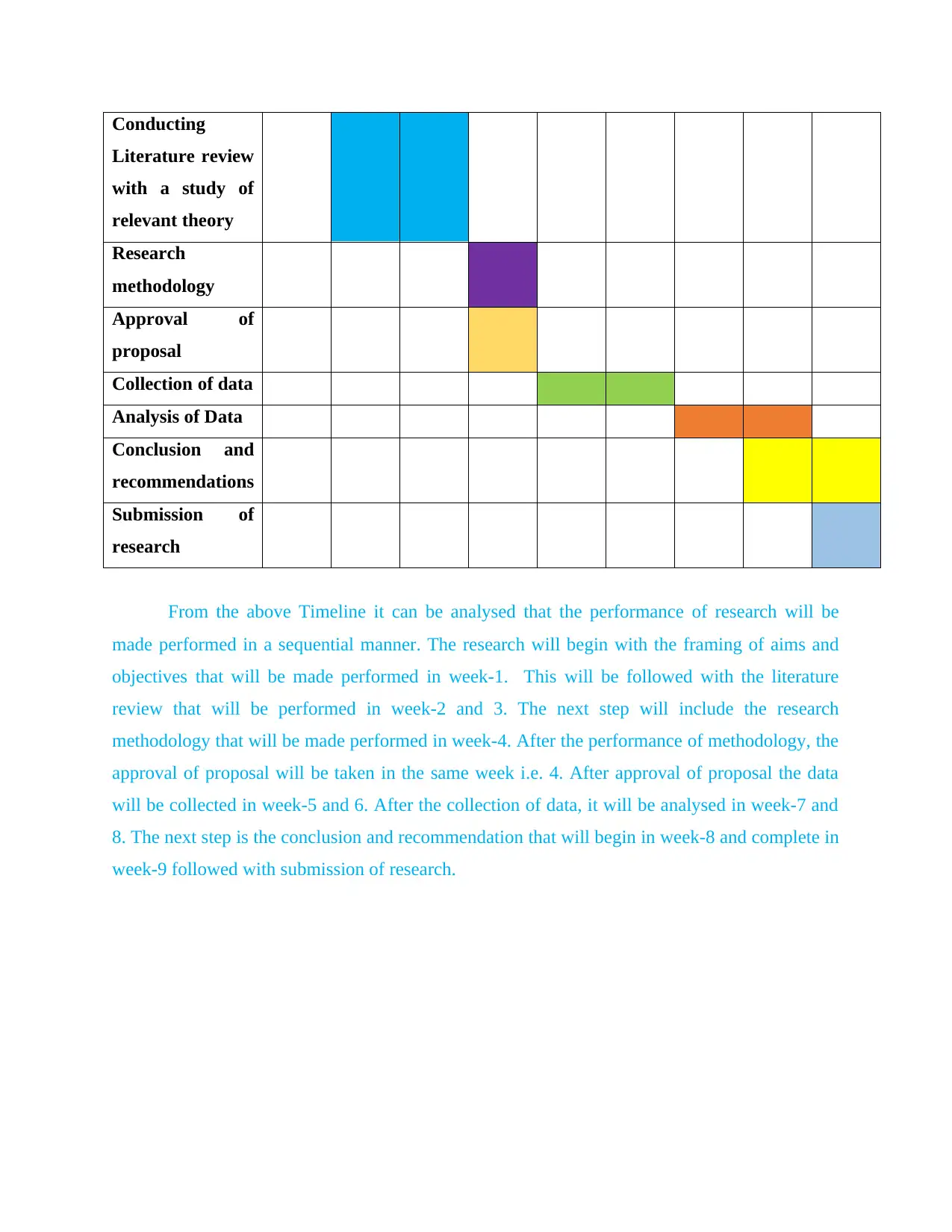
Conducting
Literature review
with a study of
relevant theory
Research
methodology
Approval of
proposal
Collection of data
Analysis of Data
Conclusion and
recommendations
Submission of
research
From the above Timeline it can be analysed that the performance of research will be
made performed in a sequential manner. The research will begin with the framing of aims and
objectives that will be made performed in week-1. This will be followed with the literature
review that will be performed in week-2 and 3. The next step will include the research
methodology that will be made performed in week-4. After the performance of methodology, the
approval of proposal will be taken in the same week i.e. 4. After approval of proposal the data
will be collected in week-5 and 6. After the collection of data, it will be analysed in week-7 and
8. The next step is the conclusion and recommendation that will begin in week-8 and complete in
week-9 followed with submission of research.
Literature review
with a study of
relevant theory
Research
methodology
Approval of
proposal
Collection of data
Analysis of Data
Conclusion and
recommendations
Submission of
research
From the above Timeline it can be analysed that the performance of research will be
made performed in a sequential manner. The research will begin with the framing of aims and
objectives that will be made performed in week-1. This will be followed with the literature
review that will be performed in week-2 and 3. The next step will include the research
methodology that will be made performed in week-4. After the performance of methodology, the
approval of proposal will be taken in the same week i.e. 4. After approval of proposal the data
will be collected in week-5 and 6. After the collection of data, it will be analysed in week-7 and
8. The next step is the conclusion and recommendation that will begin in week-8 and complete in
week-9 followed with submission of research.
Paraphrase This Document
Need a fresh take? Get an instant paraphrase of this document with our AI Paraphraser
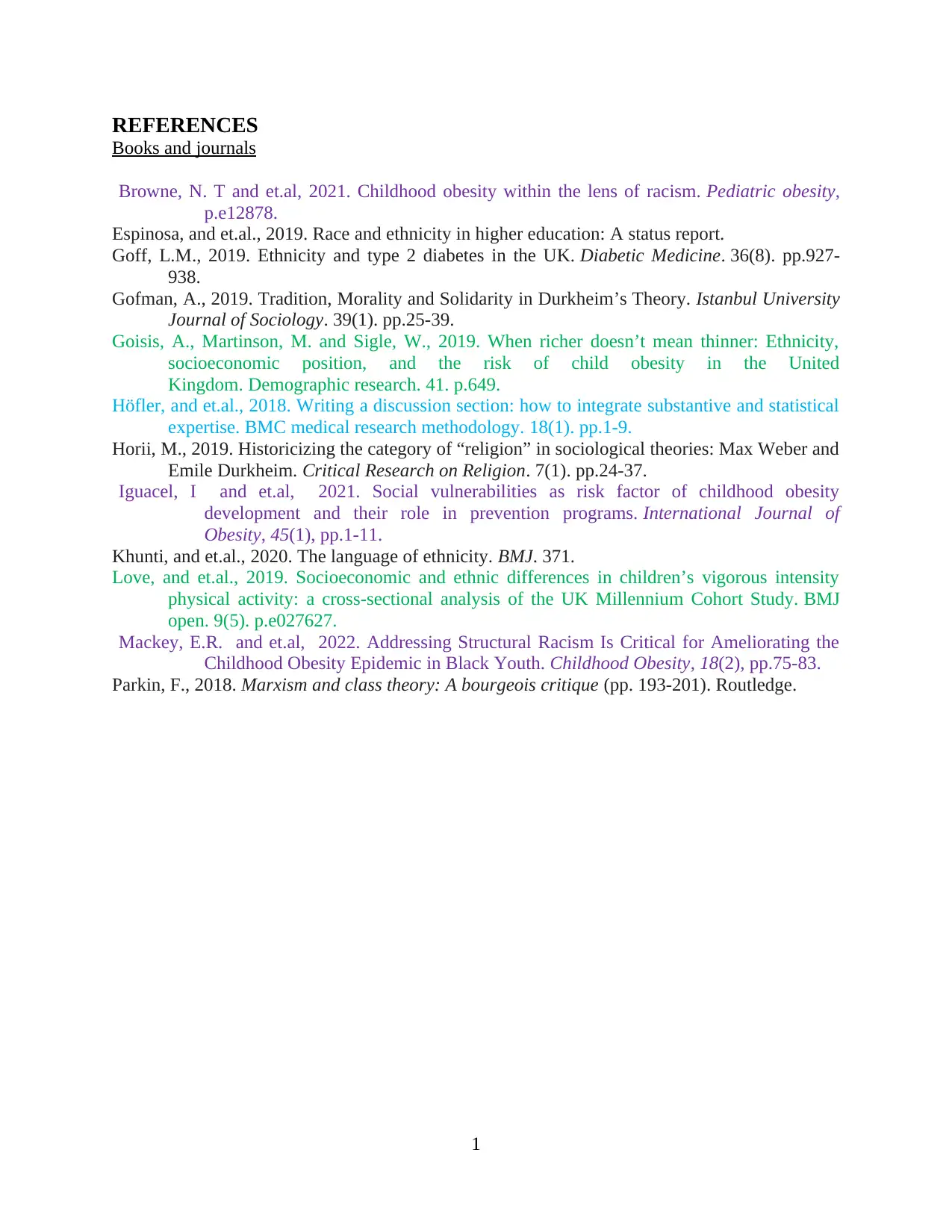
REFERENCES
Books and journals
Browne, N. T and et.al, 2021. Childhood obesity within the lens of racism. Pediatric obesity,
p.e12878.
Espinosa, and et.al., 2019. Race and ethnicity in higher education: A status report.
Goff, L.M., 2019. Ethnicity and type 2 diabetes in the UK. Diabetic Medicine. 36(8). pp.927-
938.
Gofman, A., 2019. Tradition, Morality and Solidarity in Durkheim’s Theory. Istanbul University
Journal of Sociology. 39(1). pp.25-39.
Goisis, A., Martinson, M. and Sigle, W., 2019. When richer doesn’t mean thinner: Ethnicity,
socioeconomic position, and the risk of child obesity in the United
Kingdom. Demographic research. 41. p.649.
Höfler, and et.al., 2018. Writing a discussion section: how to integrate substantive and statistical
expertise. BMC medical research methodology. 18(1). pp.1-9.
Horii, M., 2019. Historicizing the category of “religion” in sociological theories: Max Weber and
Emile Durkheim. Critical Research on Religion. 7(1). pp.24-37.
Iguacel, I and et.al, 2021. Social vulnerabilities as risk factor of childhood obesity
development and their role in prevention programs. International Journal of
Obesity, 45(1), pp.1-11.
Khunti, and et.al., 2020. The language of ethnicity. BMJ. 371.
Love, and et.al., 2019. Socioeconomic and ethnic differences in children’s vigorous intensity
physical activity: a cross-sectional analysis of the UK Millennium Cohort Study. BMJ
open. 9(5). p.e027627.
Mackey, E.R. and et.al, 2022. Addressing Structural Racism Is Critical for Ameliorating the
Childhood Obesity Epidemic in Black Youth. Childhood Obesity, 18(2), pp.75-83.
Parkin, F., 2018. Marxism and class theory: A bourgeois critique (pp. 193-201). Routledge.
1
Books and journals
Browne, N. T and et.al, 2021. Childhood obesity within the lens of racism. Pediatric obesity,
p.e12878.
Espinosa, and et.al., 2019. Race and ethnicity in higher education: A status report.
Goff, L.M., 2019. Ethnicity and type 2 diabetes in the UK. Diabetic Medicine. 36(8). pp.927-
938.
Gofman, A., 2019. Tradition, Morality and Solidarity in Durkheim’s Theory. Istanbul University
Journal of Sociology. 39(1). pp.25-39.
Goisis, A., Martinson, M. and Sigle, W., 2019. When richer doesn’t mean thinner: Ethnicity,
socioeconomic position, and the risk of child obesity in the United
Kingdom. Demographic research. 41. p.649.
Höfler, and et.al., 2018. Writing a discussion section: how to integrate substantive and statistical
expertise. BMC medical research methodology. 18(1). pp.1-9.
Horii, M., 2019. Historicizing the category of “religion” in sociological theories: Max Weber and
Emile Durkheim. Critical Research on Religion. 7(1). pp.24-37.
Iguacel, I and et.al, 2021. Social vulnerabilities as risk factor of childhood obesity
development and their role in prevention programs. International Journal of
Obesity, 45(1), pp.1-11.
Khunti, and et.al., 2020. The language of ethnicity. BMJ. 371.
Love, and et.al., 2019. Socioeconomic and ethnic differences in children’s vigorous intensity
physical activity: a cross-sectional analysis of the UK Millennium Cohort Study. BMJ
open. 9(5). p.e027627.
Mackey, E.R. and et.al, 2022. Addressing Structural Racism Is Critical for Ameliorating the
Childhood Obesity Epidemic in Black Youth. Childhood Obesity, 18(2), pp.75-83.
Parkin, F., 2018. Marxism and class theory: A bourgeois critique (pp. 193-201). Routledge.
1
1 out of 8
Related Documents
Your All-in-One AI-Powered Toolkit for Academic Success.
+13062052269
info@desklib.com
Available 24*7 on WhatsApp / Email
![[object Object]](/_next/static/media/star-bottom.7253800d.svg)
Unlock your academic potential
Copyright © 2020–2026 A2Z Services. All Rights Reserved. Developed and managed by ZUCOL.





